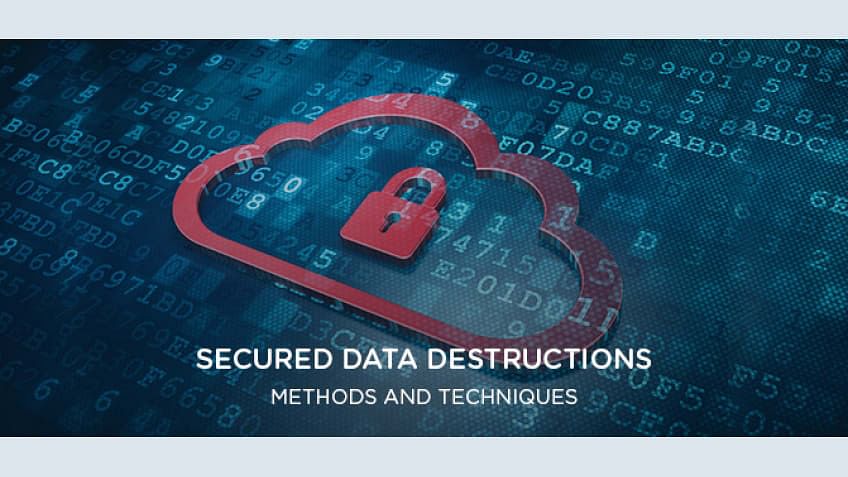Finest Practices for Data Destruction to Strengthen Your Cyber Security Framework
Finest Practices for Data Destruction to Strengthen Your Cyber Security Framework
Blog Article
The Essential Nature of Data Devastation in Upholding Computer System Security Services and Protecting Against Unauthorized Access
In an age where data violations and identity burglary are increasingly common, the value of effective information damage can not be overemphasized. Various techniques, from data cleaning to physical damage, offer as important safeguards against unapproved accessibility.
Significance of Data Devastation
In a significantly digital globe, the relevance of data devastation can not be overemphasized. As organizations generate vast quantities of sensitive information, the prospective repercussions of falling short to effectively manage and dispose of that information become increasingly severe. Information violations, identity burglary, and corporate reconnaissance position substantial risks, underscoring the need of efficient data devastation methods.

Additionally, as technology progresses, so too do the approaches through which malicious stars seek to make use of delicate info. Organizations has to stay aggressive and cautious in their information devastation methods to protect against these progressing dangers. By prioritizing information damage, business not only secure their possessions but also foster count on among clients and stakeholders, demonstrating a commitment to accountable data administration and protection practices.
Methods of Effective Information Devastation
To make certain the complete and irreversible devastation of sensitive data, companies can employ a selection of efficient techniques customized to their specific needs. One of one of the most common techniques is information wiping, which entails using specialized software program to overwrite existing data several times, making recovery basically impossible. This is particularly helpful for tough drives and solid-state drives, where standard deletion techniques are inadequate.
One more effective approach is degaussing, which uses solid electromagnetic fields to interfere with the magnetic domain names on storage space media, providing the information irretrievable. This technique is especially fit for magnetic storage space devices, such as tape drives and hard drives.
Physical damage is additionally a viable choice, entailing the shredding, squashing, or incineration of storage space gadgets. This technique warranties that information can not be recuperated, making it perfect for companies handling highly delicate information.

Conformity With Information Security Laws
Organizations must not just concentrate on reliable information devastation approaches however additionally ensure compliance with data defense laws that regulate how sensitive info is handled and gotten rid of. Abiding by these policies is essential for securing individual information and keeping consumer trust fund. Regulations such as the General Information Defense Policy (GDPR) in the European Union and the Medical Insurance Mobility and Responsibility Act (HIPAA) in the United States impose strict guidelines on information monitoring, that include requirements for the protected disposal of delicate details.
To achieve compliance, companies have to implement detailed data destruction plans that straighten with these legal structures. This includes identifying information that calls for destruction, developing procedures for protected methodsâEUR" such as shredding physical media or making use of software program that fulfills sector criteria for information wipingâEUR" and preserving in-depth documents of destruction activities. Routine audits should be performed to guarantee adherence to these policies and to determine any potential areas for improvement.
Failure to abide by data defense guidelines can lead to significant lawful ramifications, including large fines and damage to a company's track record. Incorporating compliance right into data devastation practices is not just a lawful responsibility however additionally a crucial part of a robust details safety and security strategy.
Effects of Poor Information Handling
Poor information handling can lead to serious consequences that extend beyond immediate operational setbacks. Organizations may deal with considerable economic losses as a result of information breaches, which typically result in costly remediation efforts, legal costs, and governing penalties. These monetary ramifications can hinder and stress resources growth, eventually affecting a company's profits.
Additionally, poor data handling can significantly harm an organization's online reputation. Partners, stakeholders, and read what he said customers may shed trust fund in an entity that fails to secure sensitive information, bring about lowered customer commitment and prospective loss of company possibilities. This disintegration of count on can take years to reconstruct, if it can be brought back at all.
Additionally, companies could encounter lawful ramifications arising from non-compliance with data security regulations. Such offenses might cause charges and examinations, worsening the monetary problem and more staining the company's picture.
In the realm of cybersecurity, poor information management methods can produce vulnerabilities that make systems much more vulnerable to unapproved accessibility and cyberattacks. Inevitably, these repercussions highlight the crucial significance of executing robust data managing treatments to secure sensitive info and maintain business honesty.
Finest Practices for Secure Data Disposal
/prod01/channel_3/media/tcd/itservices/images/Untitled-design-(26).png)

First of all, information need to be identified according to its sensitivity. Sensitive information requires extra rigorous disposal approaches, such as shredding physical documents and utilizing sophisticated software for electronic data wiping. Employing certified information destruction solutions ensures compliance with market regulations and criteria.
Second of all, click over here organizations must apply an information disposal plan that mandates regular audits. This policy ought to detail the treatments for data retention and destruction, ensuring that out-of-date information is taken care of without delay and safely. Educating staff members on these protocols is vital to cultivating a society of safety and security understanding.
Last but not least, preserving thorough documents of disposed data boosts liability and supplies a clear audit path. This paperwork needs to consist of the kind of information ruined, the method made use of, and the day of disposal.
Final Thought
Embracing robust methods such as data cleaning, degaussing, and physical damage, along with conformity with regulations like GDPR and HIPAA, is crucial for safeguarding sensitive info. Neglecting appropriate information disposal practices can lead to extreme consequences, consisting of information breaches and lawful effects.
In an age where information violations and identification burglary are progressively widespread, the relevance of effective data devastation can not be overemphasized. data destruction. Data breaches, identity burglary, and business reconnaissance position considerable threats, underscoring the necessity of reliable data destruction practices
Conformity with regulations such as GDPR and HIPAA mandates that companies carry out stringent information protection steps, including the safe destruction of information at the end of its lifecycle.
By prioritizing information destruction, firms not just safeguard their properties but likewise foster count on amongst stakeholders and clients, demonstrating a commitment to responsible data management and safety practices.
Organizations must not only concentrate on efficient data destruction methods yet likewise ensure conformity with data protection regulations that regulate just how delicate information is taken care of and her response disposed of.
Report this page